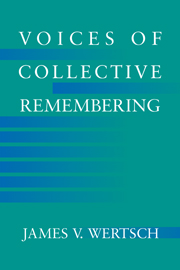Book contents
- Frontmatter
- Contents
- Introduction and Acknowledgments
- 1 An Encounter with Collective Memory
- 2 Methodological Preliminaries to the Study of Collective Remembering
- 3 Collective Memory: A Term in Search of a Meaning
- 4 State Production of Official Historical Narratives
- 5 Narrative Dialogicality and Narrative Templates in the Production of Official Collective Memory
- 6 The Consumption of Historical Narratives
- 7 Generational Differences in Collective Remembering
- Conclusion
- References
- Index
7 - Generational Differences in Collective Remembering
Published online by Cambridge University Press: 08 January 2010
- Frontmatter
- Contents
- Introduction and Acknowledgments
- 1 An Encounter with Collective Memory
- 2 Methodological Preliminaries to the Study of Collective Remembering
- 3 Collective Memory: A Term in Search of a Meaning
- 4 State Production of Official Historical Narratives
- 5 Narrative Dialogicality and Narrative Templates in the Production of Official Collective Memory
- 6 The Consumption of Historical Narratives
- 7 Generational Differences in Collective Remembering
- Conclusion
- References
- Index
Summary
When Soviet authorities cancelled nationwide history examinations in 1988 (see Chapter 5), few could envisage the road that lay ahead. The Soviet population had little experience with public debate, so it was unclear how they could take on the complex process of negotiating new forms of collective remembering. Some sort of open discussion was needed, but the level of cynicism made it difficult to see how this could happen. From the perspective of Soviet authorities, the only thing that was clear at the time was that the old system for promulgating collective memory was broken, and their action amounted to little more than a public admission that this was so.
The attempt to renegotiate collective memory in these circumstances was based on the standard assumption that what was needed was to produce a new official account of the past that would replace the old one. And as I outlined in Chapter 5, this gave rise to major efforts by the state to create new textual resources, efforts grounded largely in the dialogic, as opposed to referential, function of narrative. It remains unclear, however, whether this effort has been very effective. In part, this is due to production problems such as the unavailability of textbooks or the funds to purchase them.
What is even less clear a dozen years after the end of the Soviet era is how the textual resources that are available have been used. How do people in Russia employ the new textual means provided by the government and other sources? What do they know today about major events of the past such as World War II? What do they believe?
- Type
- Chapter
- Information
- Voices of Collective Remembering , pp. 149 - 170Publisher: Cambridge University PressPrint publication year: 2002
- 2
- Cited by

